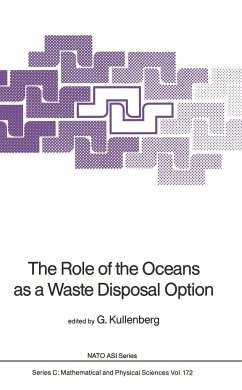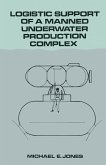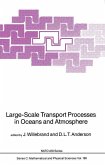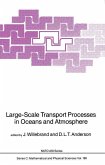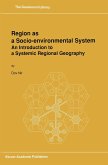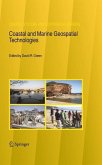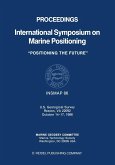Gunnar Kullenberg (ed.)
The Role of the Oceans as a Waste Disposal Option
Herausgegeben:Kullenberg, Gunnar
Gunnar Kullenberg (ed.)
The Role of the Oceans as a Waste Disposal Option
Herausgegeben:Kullenberg, Gunnar
- Gebundenes Buch
- Merkliste
- Auf die Merkliste
- Bewerten Bewerten
- Teilen
- Produkt teilen
- Produkterinnerung
- Produkterinnerung
Proceedings of the NATO Advanced Research Workshop, Vilamoura, Portugal, April 24-30, 1985
Andere Kunden interessierten sich auch für
![The Role of the Oceans as a Waste Disposal Option The Role of the Oceans as a Waste Disposal Option]() The Role of the Oceans as a Waste Disposal Option42,99 €
The Role of the Oceans as a Waste Disposal Option42,99 €![Logistic Support of a Manned Underwater Production Complex Logistic Support of a Manned Underwater Production Complex]() M. Jones (Compil.)Logistic Support of a Manned Underwater Production Complex113,99 €
M. Jones (Compil.)Logistic Support of a Manned Underwater Production Complex113,99 €![Large-Scale Transport Processes in Oceans and Atmosphere Large-Scale Transport Processes in Oceans and Atmosphere]() Large-Scale Transport Processes in Oceans and Atmosphere125,99 €
Large-Scale Transport Processes in Oceans and Atmosphere125,99 €![Large-Scale Transport Processes in Oceans and Atmosphere Large-Scale Transport Processes in Oceans and Atmosphere]() J. Willebrand / D.L.T. Anderson (Hgg.)Large-Scale Transport Processes in Oceans and Atmosphere125,99 €
J. Willebrand / D.L.T. Anderson (Hgg.)Large-Scale Transport Processes in Oceans and Atmosphere125,99 €![Region as a Socio-Environmental System Region as a Socio-Environmental System]() D. NirRegion as a Socio-Environmental System113,99 €
D. NirRegion as a Socio-Environmental System113,99 €![Coastal and Marine Geospatial Technologies Coastal and Marine Geospatial Technologies]() Coastal and Marine Geospatial Technologies121,99 €
Coastal and Marine Geospatial Technologies121,99 €![Proceedings International Symposium on Marine Positioning Proceedings International Symposium on Marine Positioning]() Muneendra Kumar (Managing ed.) / G.A. MaulProceedings International Symposium on Marine Positioning113,99 €
Muneendra Kumar (Managing ed.) / G.A. MaulProceedings International Symposium on Marine Positioning113,99 €-
-
-
Proceedings of the NATO Advanced Research Workshop, Vilamoura, Portugal, April 24-30, 1985
Hinweis: Dieser Artikel kann nur an eine deutsche Lieferadresse ausgeliefert werden.
Hinweis: Dieser Artikel kann nur an eine deutsche Lieferadresse ausgeliefert werden.
Produktdetails
- Produktdetails
- Nato Science Series C: 172
- Verlag: Springer / Springer Netherlands
- Artikelnr. des Verlages: 978-90-277-2209-6
- 1986.
- Seitenzahl: 736
- Erscheinungstermin: 31. März 1986
- Englisch
- Gewicht: 1150g
- ISBN-13: 9789027722096
- ISBN-10: 9027722099
- Artikelnr.: 27654424
- Herstellerkennzeichnung
- Libri GmbH
- Europaallee 1
- 36244 Bad Hersfeld
- gpsr@libri.de
- Nato Science Series C: 172
- Verlag: Springer / Springer Netherlands
- Artikelnr. des Verlages: 978-90-277-2209-6
- 1986.
- Seitenzahl: 736
- Erscheinungstermin: 31. März 1986
- Englisch
- Gewicht: 1150g
- ISBN-13: 9789027722096
- ISBN-10: 9027722099
- Artikelnr.: 27654424
- Herstellerkennzeichnung
- Libri GmbH
- Europaallee 1
- 36244 Bad Hersfeld
- gpsr@libri.de
The oceans as a waste disposal option - management, decision making and policy.- Acceptable environmental change from waste disposal.- Natural variability and waste disposal options.- Basic factors affecting the land/freshwater versus the sea option for waste disposal.- Sewage treatment and disposal - constraints and opportunities.- Engineering of ocean outfalls.- Sewage sludge disposal options.- The environmental impact of sludge dumping at sea and other disposal options in the U.K. - trace metal inputs.- Freshwaters as waste disposal systems: An interpretation of the experimental lakes area, Canada whole-ecosystem experiments.- A comparison of aquatic and terrestrial nutrient cycling and production processes in natural ecosystems, with reference to ecological concepts of relevance to some waste disposal issues.- An integrated approach to analyse the North Sea ecosystem behaviour in relation to waste disposal.- Experiences of the Federal Republic of Germany with dumping of sewage sludge.- The Izmit Bay case study.- Sites for effluent outfall and sludge dumping in the Saronikos Gulf, Greece.- A comparative study of copper cycles in two freshwater environments.- A case study of waste inputs in the Tagus Estuary.- The Baltic Sea: Conditions and options of management.- Ecological and human health criteria for cross ecosystem comparison of waste disposal impacts.- Organic chemical pollutants in the oceans and groundwater: A review of fundamental chemical properties and biogeochemistry.- Organo-chlorines - A review of uses, control and disposal options.- Metal pollution in the Great Lakes in relation to their carrying capacity.- Marine disposal of radioactive waste: An overview with examples from the coastal water situation.- The practice and assessment of sea dumping of radioactive waste.- Comparison of land and sea disposal options for low and intermediate level radioactive wastes.- Nuclear Waste disposal: Ocean or continental crust?.- Dispersal of particulate waste on an open continental shelf.- Hydrodynamical modelling as a tool in waste disposal selection. A case study on Sado Estuary.- Disposal of sewage in dispersive and non-dispersive areas: Contrasting case histories in British coastal waters.- Mobility of pollutants in dredged materials: Implications for selecting disposal options.- Measuring the effects of pollution at the cellular and organism level.- Biological indices of changes including primary production.- Physiological and cellular responses of animals to environmental stress - case studies.- Biological effects studies at various levels along the U.S. Pacific coast.- Social aspects of waste disposal.- Summary of the workshop.
The oceans as a waste disposal option - management, decision making and policy.- Acceptable environmental change from waste disposal.- Natural variability and waste disposal options.- Basic factors affecting the land/freshwater versus the sea option for waste disposal.- Sewage treatment and disposal - constraints and opportunities.- Engineering of ocean outfalls.- Sewage sludge disposal options.- The environmental impact of sludge dumping at sea and other disposal options in the U.K. - trace metal inputs.- Freshwaters as waste disposal systems: An interpretation of the experimental lakes area, Canada whole-ecosystem experiments.- A comparison of aquatic and terrestrial nutrient cycling and production processes in natural ecosystems, with reference to ecological concepts of relevance to some waste disposal issues.- An integrated approach to analyse the North Sea ecosystem behaviour in relation to waste disposal.- Experiences of the Federal Republic of Germany with dumping of sewage sludge.- The Izmit Bay case study.- Sites for effluent outfall and sludge dumping in the Saronikos Gulf, Greece.- A comparative study of copper cycles in two freshwater environments.- A case study of waste inputs in the Tagus Estuary.- The Baltic Sea: Conditions and options of management.- Ecological and human health criteria for cross ecosystem comparison of waste disposal impacts.- Organic chemical pollutants in the oceans and groundwater: A review of fundamental chemical properties and biogeochemistry.- Organo-chlorines - A review of uses, control and disposal options.- Metal pollution in the Great Lakes in relation to their carrying capacity.- Marine disposal of radioactive waste: An overview with examples from the coastal water situation.- The practice and assessment of sea dumping of radioactive waste.- Comparison of land and sea disposal options for low and intermediate level radioactive wastes.- Nuclear Waste disposal: Ocean or continental crust?.- Dispersal of particulate waste on an open continental shelf.- Hydrodynamical modelling as a tool in waste disposal selection. A case study on Sado Estuary.- Disposal of sewage in dispersive and non-dispersive areas: Contrasting case histories in British coastal waters.- Mobility of pollutants in dredged materials: Implications for selecting disposal options.- Measuring the effects of pollution at the cellular and organism level.- Biological indices of changes including primary production.- Physiological and cellular responses of animals to environmental stress - case studies.- Biological effects studies at various levels along the U.S. Pacific coast.- Social aspects of waste disposal.- Summary of the workshop.

